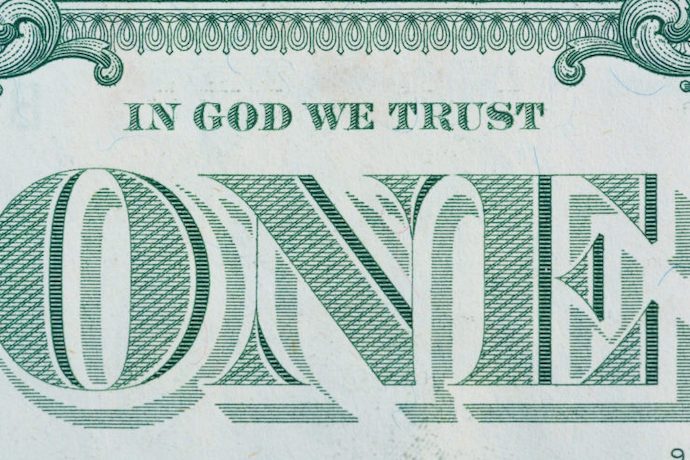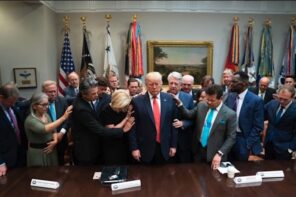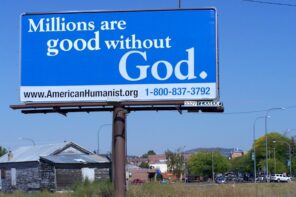The following is the first in a breezy three-part series on the ubiquitous “In God We Trust” motto, which is featured prominently in the Project Blitz playbook. This first installment tells the story of the motto’s sketchy origin; the second examines the legality of its presence in a secular nation; and the third reveals the coordinated battle waged by an emboldened Christian nationalist movement. Read now or download the trilogy for a heckuva beach read. – eds
How did “In God We Trust” get stamped on the currency of a country with a godless Constitution? How did a secular nation get a religious national motto?
The story is not one of national unity, but of exploitation. It does not begin, as so many claim, with the American founding, but rather four score and seven years later, in 1863. Lincoln’s Emancipation Proclamation went into effect on January 1 of that year, conscriptions followed, as did some of the war’s bloodiest battles, including Chickamauga and Gettysburg. Brothers were killing brothers—more than 2 percent of the population, or about eight million Americans today, would die. Families and the country were being torn apart.
Three men recognized this time of “national peril and danger” as an opportunity. These men, forerunners to today’s Christian nationalists, took advantage of a wounded, distracted nation to use their government power to impose their personal religion on us all. To them, the timing was lucky: People were too busy dying for the Constitution to protect it from a rear-guard, religious assault.
The story begins with a “minister of the Gospel,” Mark Watkinson, who wrote to Secretary of the Treasury Salmon Chase. Watkinson did not know Chase personally, but began by presuming that Chase was, “probably a Christian.” After the pleasantries, Watkinson moved to fearmongering, “What if our Republic were now shattered beyond reconstruction?” Posterity would look to our coinage and think “that we were a heathen nation.” Watkinson proposed removing that heathen, “the Goddess of Liberty,” and adding a new, godly motto, something like, “God, liberty, law.”
With the sense of entitlement typical of a religious majoritarian, Watkinson claimed that “no possible citizen could object” to such language. The change, Watkinson concluded, “would relieve us from the ignominy of heathenism. This would place us openly under the divine protection we have personally claimed. From my heart I have felt our national shame in disowning God as not the least of our present national disasters.”
This should sound familiar, especially given the blame thrown at godlessness in the wake of mass shootings and the “thoughts and prayers” offered as a “solution.” These are the modern equivalent of Watkinson’s suggestion.
Treasury Secretary Chase wrote the Director of the Mint, James Pollock: “The trust of our people in God should be declared on our national coins.”
Chase found a receptive collaborator. Pollock later served as vice president of a group dedicated to amending America’s godless Constitution with an explicit acknowledgement of Jesus. Pollock wrote back, crystallizing the Christian nationalism behind our future national motto. He believed that because the United States is “a Christian Nation . . . The time for the introduction of this or a similar motto, is propitious and appropriate. ‘Tis an hour of National peril and danger—an hour when man’s strength is weakness—when our strength and our nation’s salvation, must be in the God of Battles.” Pollock wanted to take advantage of the nation’s fear. The war itself was “propitious.”
Chase approved the final language, “In God We Trust,” on December 9, 1863. Congress made the change official a few months later and it first appeared on coins that next year.
What began as a bygone #ThoughtsAndPrayers, marking territory in the name of god, quickly snowballed. The pious slogan would convert the godless. In a 1907 congressional debate precipitated when Teddy Roosevelt refused to include the phrase on $10 and $20 gold coins because doing so was sacrilegious, Rep. Ollie James argued for the motto with a militant Christian nationalism:
This country is not only a Christian nation, but we are … sending to foreign countries and to distant people our missionaries to preach the religions of Jesus Christ, and … when this gold … is held in the hands of those who do not know of the existence of the Saviour of the world, we can say: “Here are the dollars of the greatest nation on earth, one that does not put its trust in floating navies or in marching armies, but places its trust in God.”
Congress added the phrase to paper currency five decades later. A “compelling reason” for doing so was to spread the Gospel “behind the Iron Curtain,” as one Congressman put it.
The national motto is not an expression of national sentiment or tribute to some godly golden age. It’s a monument to Christian exploitation of a national crisis. This is true of other national verbiage too, as I detail in The Founding Myth; in particular, “one nation, under God” in the Pledge of Allegiance, and the presidential practice of ending addresses with “God bless America,” which dates to Nixon’s Watergate scandal. Christian nationalists seize on fearful times, including the Red Scare of the 1950s when In God We Trust became the national motto, to impose their religion. These religious expressions often wipe out earlier, unifying sentiments, such as “one nation, indivisible” and E pluribus unum, from many, one.
There is a perverse irony in three men choosing to promote religion when fighting a war to preserve a national union. While the country was tearing itself apart, these men imagined that the nation’s fate hinged not on full equality for Black Americans, but on coins declaring America to be a Christian nation.
Three Christian nationalists saddled millions of Americans with a religious motto that violates our constitutional commitment to a secular government, at a time when people couldn’t fight back.





